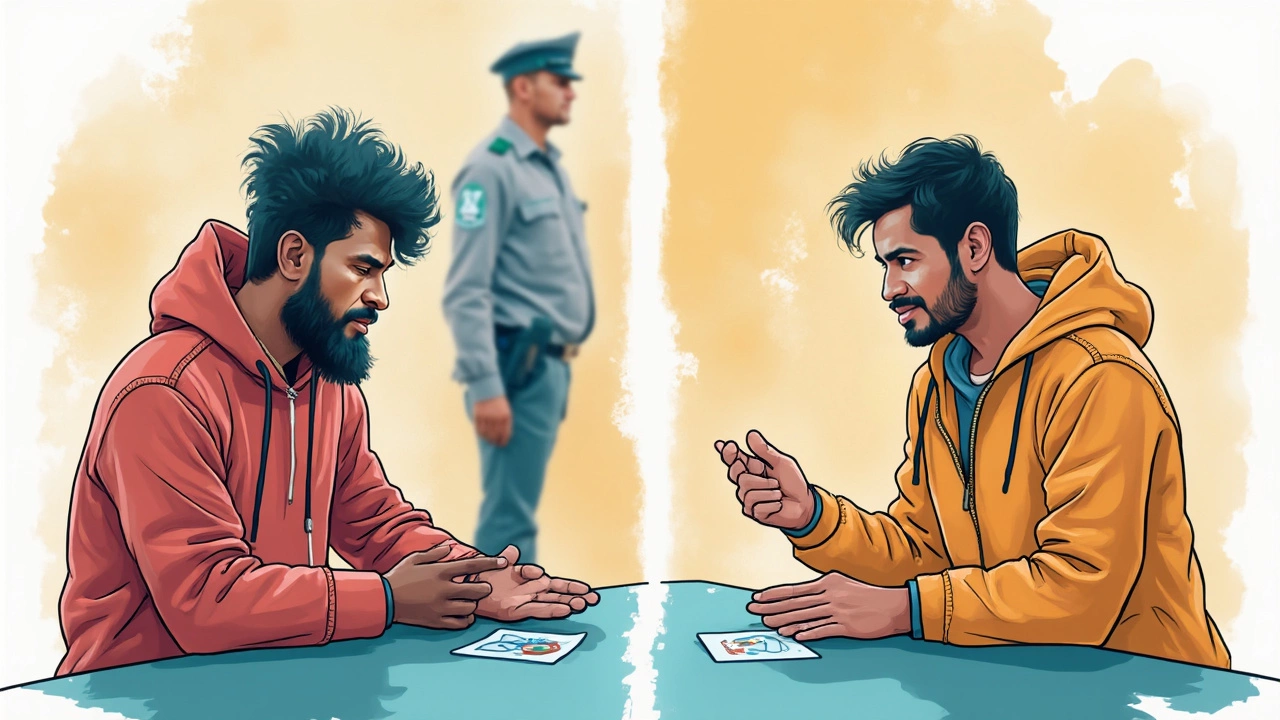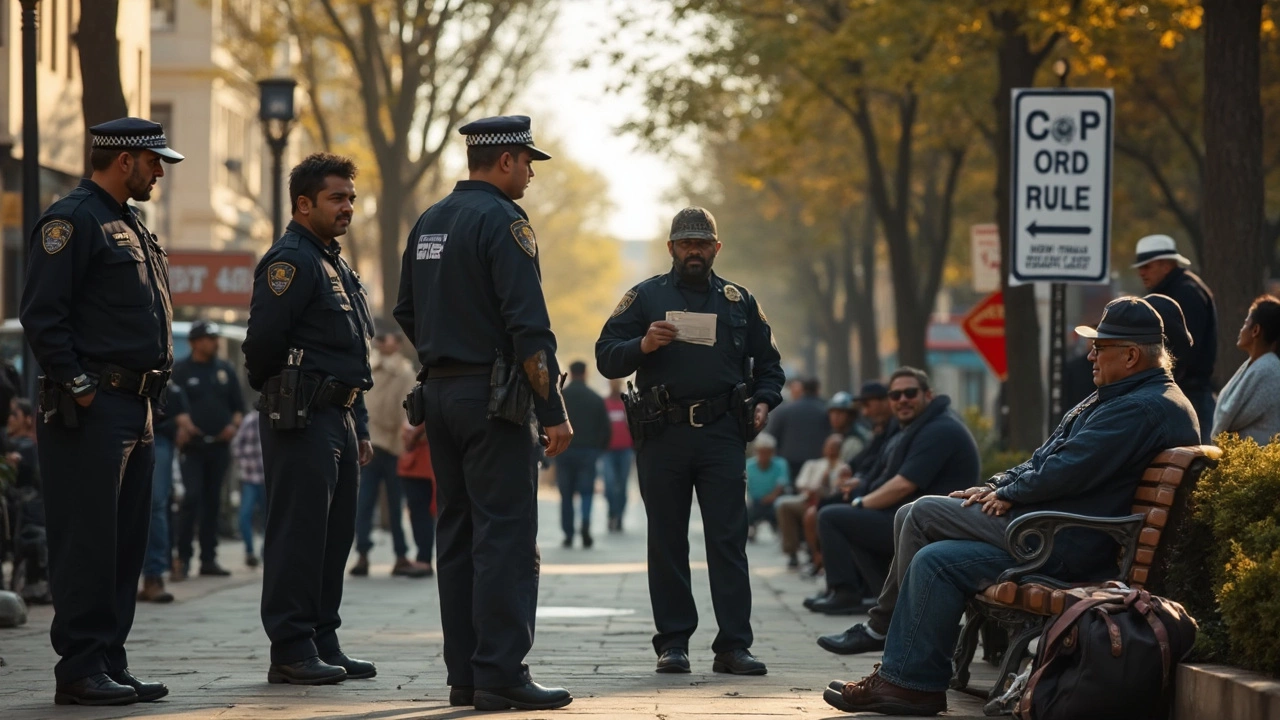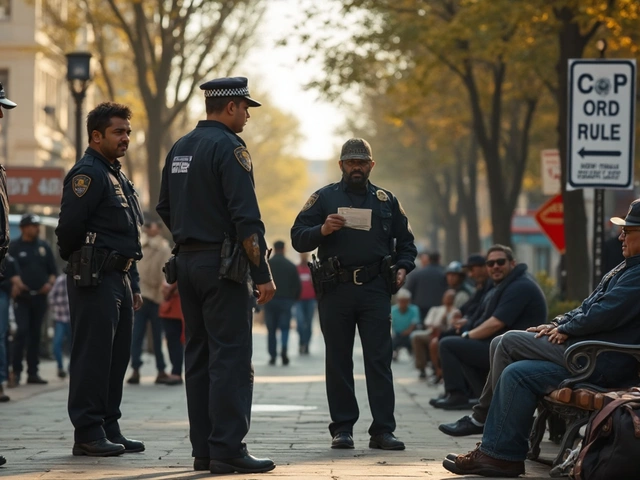Being homeless isn’t a crime in Texas, but life on the streets can feel like walking a legal tightrope. While nobody gets arrested just for not having a roof, certain actions linked to surviving outside—like sleeping in parks or setting up a tent downtown—can land you in legal trouble.
Austin, for example, made big headlines when it banned public camping, which basically means you can get a ticket or even arrested for just trying to find a safe spot to sleep. Other cities have similar rules, even if they call them something else. These laws don’t make homelessness itself illegal, but they do make it tougher for people who literally have nowhere else to go.
If you’re in Texas and on the edge, knowing where it’s legal to rest, where you can get help, and what to do if you get ticketed can save you from a lot of hassle. Sticking to shelters when you can—yeah, sometimes they’re crowded and noisy, but they’re safer than getting cuffed for breaking city codes. If you’ve got a pet like my dog Finn, some places will even let you both in, though it takes a little hunting.
- Homelessness Versus Breaking the Law
- Texas Laws on Public Camping and Loitering
- How Local Cities Handle Homelessness
- Where to Find Shelter and Support
- Tips for Staying Safe and Knowing Your Rights
Homelessness Versus Breaking the Law
Just being homeless in Texas isn’t enough to get you thrown in jail. There isn’t any state law that says you can’t be without a home. But things get complicated when local rules mix in. What trips people up is the stuff that’s caused by living outside or in public spaces.
Cities often have ordinances—local laws—against things like sleeping on benches, camping under bridges, or just hanging out in certain places for too long. These are called “quality of life” laws. Breaking them doesn’t mean you’re a criminal, just that you could end up with a ticket or sometimes even get arrested, especially if you’ve got a few of these tickets stacked up.
For example, Dallas and Austin both passed city rules banning people from camping in public. Austin saw hundreds of citations and arrests in just the first year the ban went into effect. If someone refuses to move after being told to leave, things go from a ticket to a criminal charge fast. So yes, homelessness isn’t a crime, but surviving on Texas streets can lead to a criminal record if folks aren’t careful.
Take a look at how this shakes out in practice:
| City | Main Offense | Penalty |
|---|---|---|
| Austin | Public Camping | Citation or Arrest |
| Houston | Loitering, Trespassing | Warning, Fine, or Jail |
| San Antonio | Blocking sidewalk | Fine or Jail |
Knowing what actually lands people in trouble is half the battle. The real issue? Just surviving in public—something largely out of anyone’s control—often puts homeless folks right at odds with the law. And those small tickets do add up, making it tougher to get back on your feet with fines and records following you around.
Texas Laws on Public Camping and Loitering
If you hear the term “public camping” in Texas law, it means exactly what you’d guess: sleeping, setting up tents, or living anywhere that isn’t private property or a shelter. Texas passed a statewide law in 2021—House Bill 1925—that bans camping in public places not officially marked for that use. So, if you pitch a tent under a bridge or on a city sidewalk, police can fine you up to $500 and may clear the area. The law says local cops have to offer info on shelters or services before writing a ticket, but that doesn’t always help if beds are full.
Many Texas cities go even further with local ordinances. Austin and Dallas both have city rules against camping, sleeping, and laying out bedding in public areas. If they catch you, you could get a citation or even taken in for repeat offenses. And loitering—just hanging around in certain public spots without a clear reason—can also lead to ticketing in some cities. Houston, for example, has used trespassing and loitering rules to move people along from downtown areas and bus stations.
If you’ve got nowhere else to go, it’s smart to know what’s off-limits. Here are some common actions that can trigger issues:
- Sleeping or camping in parks, sidewalks, or underpasses
- Having bedding, tents, or blankets in public spaces
- Building or having a campfire outside of a designated area
- Blocking entrances or walkways with belongings
Here’s a quick look at some key facts from a 2023 state report on homelessness and public spaces:
| City | Ban on Public Camping | Ban on Public Sleeping | Fines/Arrest |
|---|---|---|---|
| Austin | Yes | Yes | Up to $500, repeat arrest |
| Dallas | Yes | Yes | Ticket or jail for repeat |
| Houston | Yes | Sometimes | Ticket, move along orders |
What does this mean day to day? If police see you in a public spot, the first step is usually asking you to move, but the law backs them to write tickets. Most cities say they want to connect people to services, but a lot of times, it just ends up pushing folks around without real solutions.
The best move: Look for places that allow sleeping or reach out to a homeless shelter instead of risking a fine. Keep your stuff neat and don’t block paths if you have to rest outdoors. If you do get a ticket, don’t ignore it—help is out there, and some legal aid clinics work with people in this exact situation.

How Local Cities Handle Homelessness
Every Texas city has its own take on dealing with homelessness. Some lean hard on the rules, while others try a mix of support and enforcement. Let’s get real: Big cities like Austin, Dallas, Houston, and San Antonio all tackle this issue differently. Here’s a snapshot of what’s really going on.
Austin used to be one of the few places in Texas where you could sleep outside without facing fines, but that changed after voters passed a ban on public camping in 2021. Now, if cops find you camping in restricted public spaces—think downtown sidewalks, underpasses, or greenbelts—they can ticket you or make you move along. The city did ramp up outreach programs, but the ban means life outside got tougher overnight.
In Dallas, strict anti-camping rules are paired with regular "sweeps," where city crews clear out makeshift camps. Folks caught in these sweeps often lose their belongings. If you’re living in Dallas, know that public camping, even resting on a bench for too long, can draw police attention. The city provides shelter beds but demand outpaces supply.
Houston takes a bit more balanced approach. Yes, public camping is banned, but the city partners with nonprofits and faith groups to offer alternatives like subsidized housing and outreach teams that check on people before writing tickets. Recent stats showed Houston moved more than 25,000 people out of homelessness since 2012, more than any other Texas city.
San Antonio operates through coordinated care networks—agencies working together to connect folks with housing, health care, or employment. But, just like other cities, camping bans mean you can still get swept if you’re found bedding down in public parks or under highways.
| City | Public Camping Ban? | Support Services | Notable Actions |
|---|---|---|---|
| Austin | Yes | Outreach teams, shelter funding | 2021 public camping ban |
| Dallas | Yes | Shelters, police outreach | Regular camp sweeps |
| Houston | Yes | Housing-first, nonprofit partners | 25,000+ housed since 2012 |
| San Antonio | Yes | Coordinated care, housing programs | Joint agency effort |
If you’re out in any Texas town, always check local rules. They can change fast, especially after city elections or big local news stories. Using a library computer or asking at a local day center can help you keep up with the latest. Shelter staff often know what spots are safer or which parks might see cops rolling by. The bottom line: Texas law lets cities decide the rules, so street life here depends a lot on your ZIP code.
Where to Find Shelter and Support
It’s tough being homeless anywhere, but homelessness in Texas comes with its own set of hoops. The first big hurdle? Finding a safe spot to sleep. Most big cities have a network of homeless shelters and drop-in centers, though every place works a little differently.
Major cities like Houston, Dallas, San Antonio, and Austin have some well-known options. For example, in Houston, the Coalition for the Homeless runs a hotline (713-739-7514) that connects people with shelter beds all year. Austin has the Austin Resource Center for the Homeless (ARCH)—and if you’re in San Antonio, Haven for Hope is a one-stop shop offering not just a bed, but everything from meals to job help.
Keep in mind that shelter policies can vary. Some shelters require a photo ID, others might have curfews or only accept families. If you’ve got a pet (I’ve been there with Finn!), call ahead—places like the Thrive Resource Center in Dallas sometimes allow pets, at least if you ask nicely. Don’t give up after one no. The network of help is always growing.
| City | Main Shelter | Contact/Website |
|---|---|---|
| Houston | Coalition for the Homeless | homelesshouston.org |
| Dallas | The Bridge | bridgehrc.org |
| Austin | ARCH | austinecc.org |
| San Antonio | Haven for Hope | havenforhope.org |
If you don’t want to walk into a shelter cold, you can call 2-1-1 anywhere in Texas. It’s a statewide info line that points you to the closest open bed, food pantry, or mental health spot. They’ll also help if you’re looking for a specific homeless shelter that accepts families or folks with addictions.
For people struggling to get back into permanent housing, there are programs like Rapid Re-Housing, which helps cover first month’s rent and case management. Veterans and young people have special resources, too. In Austin, the Caritas of Austin program connects people with support, starting from the basics and going all the way to job training.
“Safety net programs aren’t just a handout—they’re a hand up for anyone wanting to get off the street and into stable housing,” says Michael Nichols, president of the Coalition for the Homeless in Houston.
Try to reach out to these resources even if you feel like you’ve been turned away too many times before. A simple phone call or visit could lead to a bed, a meal, or even a way off the streets.

Tips for Staying Safe and Knowing Your Rights
Staying safe as a homeless person in Texas takes more than keeping an eye on your stuff. Homelessness can put you in tricky situations, especially with the patchwork of Texas laws and city rules about where you can sleep or hang out. Here’s what actually helps:
- Know your local ordinances: Cities like Austin and Dallas have laws against public camping. Before you settle in for the night, check out city or shelter resource guides. You’ll find maps showing where overnight stays are allowed—or where cops hand out tickets.
- Carry your ID and important papers: If police ask for ID, it’s easier if you have a driver’s license, state ID, or shelter paperwork. Not having these can make a regular stop way more complicated.
- Use shelters and outreach teams: Even if shelters aren’t perfect, they’re safer than the streets. Most counties have outreach workers who know where open beds, showers, and meal programs are—ask for help before it gets late.
- If you get ticketed or arrested: Don’t ignore it. Some cities have “homeless courts” or special dockets. If you can, show up—judges are often willing to work with you if you explain your situation. Legal Aid of Northwest Texas and Texas RioGrande Legal Aid can sometimes help for free.
- For people with pets: Look for “pet-friendly shelters Texas”—a couple exist in Dallas and Houston. That way, you and your furry friend can stay together without risking trouble.
Kinda wild fact: According to a 2023 study by the Texas Homeless Network, about 73% of unsheltered folks in major cities have gotten at least one ticket for just sleeping outside. That’s a lot of legal headaches for just trying to get some rest.
| Major City | Public Camping Ordinance? | Homeless Courts Available? |
|---|---|---|
| Austin | Yes | Yes |
| Dallas | Yes | Yes |
| Houston | Yes | No |
If you’re in trouble, dial 2-1-1, the Texas help line, and ask for homeless shelters or legal support in your area. Stay alert. Trust your gut—if a spot feels sketchy, move on if you can. Most importantly, remember: just because life is rough doesn’t mean you lose your rights. You’re still protected by state and federal law, even if you don’t have an address.





